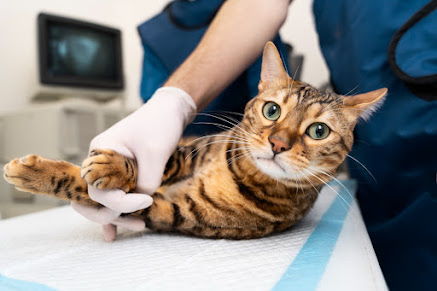What is Ear Infections and how to prevent it in cats ?
What is an ear infection in cats?
An ear infection in a cat is an inflammation of the ear canal. This can be caused by a number of things, including bacteria, yeast, ear mites, or allergies.
Symptoms of an ear infection in cats:
The most common symptoms of an ear infection in cats include:
- Head shaking
- Ear scratching
- Ear discharge (clear, yellow, or brown)
- Redness and swelling of the ear canal
- Bad odor coming from the ear
- Pain
- Hearing loss
- Dizziness
Causes of ear infections in cats:
There are a number of things that can cause an ear infection in a cat, including:
- Bacteria: Bacteria are the most common cause of ear infections in cats. This is usually due to a build-up of wax and debris in the ear canal, which provides a breeding ground for bacteria.
- Yeast: Yeast can also cause ear infections in cats, especially if they have a weakened immune system.
- Ear mites: Ear mites are small parasites that can live in the ear canal of cats. They can cause itching, inflammation, and discharge.
- Allergies: Allergies can also lead to ear infections in cats. This is because allergies can cause inflammation in the ear canal, which makes it more susceptible to infection.
- Foreign bodies: Foreign bodies, such as grass seeds or dirt, can also get stuck in the ear canal and cause an infection.
- Underlying health conditions: Some underlying health conditions, such as diabetes or kidney disease, can also increase the risk of ear infections in cats.
How to diagnose an ear infection in cats:
Your vet will be able to diagnose an ear infection in your cat by examining their ears and looking for signs of inflammation, discharge, or pain. They may also take a sample of the ear discharge to send to a laboratory for testing.
Treatment for ear infections in cats:
The treatment for an ear infection in a cat will depend on the cause of the infection. For bacterial infections, your vet will prescribe antibiotics. For yeast infections, they may prescribe antifungal medications. If ear mites are the cause, your vet will prescribe an anti-parasitic medication.
In addition to medication, your vet may also recommend cleaning your cat's ears regularly to help prevent future infections. You can use a solution that your vet recommends, or you can use a mild shampoo or baby shampoo.
Preventing ear infections in cats:
There are a few things you can do to help prevent ear infections in your cat, including:
- Regularly clean your cat's ears: This will help to remove wax and debris that can build up and lead to infections.
- Avoid getting water in your cat's ears: This is especially important if your cat swims or bathes often.
- Keep your cat's ears dry: If your cat's ears get wet, be sure to dry them thoroughly.
- Take your cat to the vet for regular checkups: This will allow your vet to catch any ear infections early on and treat them before they become serious.
If you notice any signs of an ear infection in your cat, it's important to take them to the vet right away. Ear infections can be very painful for cats, and if left untreated, they can lead to serious complications.
Here are some additional tips for preventing ear infections in cats:
- Keep your cat's ears free of debris.
- Avoid getting water in your cat's ears.
- Use a mild shampoo or baby shampoo to clean your cat's ears.
- Take your cat to the vet for regular checkups.
If you notice any signs of an ear infection in your cat, such as head shaking, ear scratching, or discharge, it's important to take them to the vet right away. Early diagnosis and treatment are important to prevent complications.






